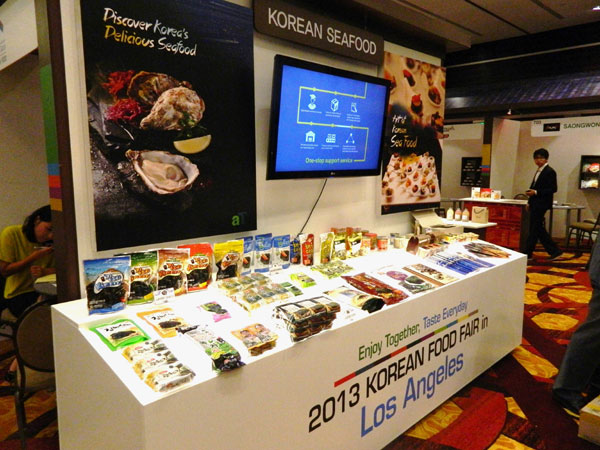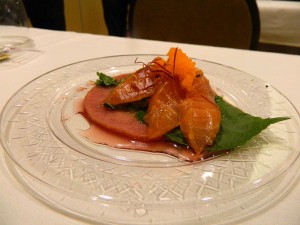LOS ANGELES—Besides food booths at a Filipino community fiesta, what can make a hungry Fil-Am manic like a kid in a candy store? A Korean food fest that’s what, with visions of kimchi and various umami-laden fare dancing in one’s head.
Get this—29 food export companies gathered at the Hyatt Regency in downtown Los Angeles for the first ever Korean Food Fair, hosted by the Korean Ministry of Agriculture, Food, and Rural Affairs. Yes, sir, I was there.
The two-day event from Oct. 22 to 23 meant to match Korea-based exporters with buyers from the United States, Canada and South America, with face-to-face meetings on how to promote and distribute products in the mainstream market.
I’m thinking—do they really think Korean food needs further promotion in the US mainstream? It’s now almost as American as burrito. On second thought, if our knowledge is limited to Korean barbeque and kimchi, then we are totally missing out on some great food.
Anyhow, it was Korean fermented and organic foods galore. Nine of the featured products were fresh and healthful items like persimmons, chestnuts, oyster mushrooms and seaweed while the rest of the selection consisted of teas, fruit juices and more traditional foods and sauces like kimchi and curry.
One of the star exports was the giant Korean pears, nearly the size of a grapefruit. Its watery goodness and crispness were evident in a sumptuous appetizer, a salmon sashimi and seaweed salad with a slice of persimmon vinegar-soaked Korean pear, prepared by the renowned executive chef of the Marine Room La Jolla Beach and Tennis Club and winner of the Top Chef Korean Food Challenge, Chef Bernard Guillas.
Chef Guillas along with Korean chef and Cathlyn Choi, host of “Cathlyn’s Korean Kitchen” on PBS, led a panel on how people can feel less intimidated preparing and cooking Korean dishes.
Guillas, who creates French and Korean fusion dishes, emphasized the importance of having a spokesperson who can market the food and ingredients while relating to both sides of the world.
“You need a Korean chef who is going to propel the Korean food movement. You need somebody who is going to be a spokesperson,” Guillas said.
He used bibimbap, a popular Korean dish, as an example as to how chefs can make the dish more relatable to those who are not acquainted with it.
“You look at bibimbap. If you go bibimbap, a vegetable casserole, they go, ‘Oh, rice vegetable casserole.’ From there, you just told them what it was. And then they’ll really be able to embrace it and say, “I really want to taste this. I really want to eat it,’” Guillas elaborated.
Building off of the theme of Korean food as healthful and organic, Choi explained how the common practice of fermentation and using chili powder and sea salt as main ingredients for preparing soups, vegetable and seafood dishes have made Korean foods more nutritious for the body.
Choi also refuted the notion that all of Korean cuisine is spicy, explaining that there are at least 200 kinds of kimchi and not all of them have the same spices.
Choi advised Korean food manufacturers to be more committed to changes in labeling if they really want to penetrate the American market.
“It’s nice in general, but the labeling, that really needs to be improved because most of the products right now in the stores, they are mainly in Korean,” Choi said. “The customers can’t really buy the ingredients they need to buy because they can’t read Korean.”
According to the United States Trade Representative website, agricultural imports from Korea to the US amounted to $333 million in 2011, with processed fruits and vegetables and snack foods including chocolate as the most imported products.
But with the increasing demand for Korean fermented and organic foods in the international market, Korean exporters are trying to attract buyers with their selection of fresh products.
Sun Jun Kim, owner of Raonjena Food, a company that sells persimmons, Korean pears and chestnuts, he hopes that setting up at the Korean food fair will grab the attention of American buyers.
“I want more customers to see my items and I hope they buy it,” Kim said.



